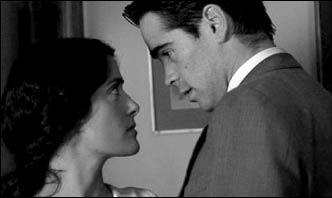Writer's Cramp: Ask the Dust
by George Sax

It’s easy to believe that Robert Towne’s new movie, Ask the Dust, has meant a lot to him. As he tells it, he spent at least eight years trying to get it made. And he may have wanted to do it for a lot longer: he was a friend of John Fante, the author of the same-named novel he’s adapted for this movie, and Fante died almost twenty-three years ago.
Fante was, like Towne, a screenwriter, but a much less heralded one. He toiled in Hollywood’s dream mills when writers could be rather well paid, but were seldom accorded much influence or respect. Like many other writers, Fante hadn’t intended to be a scenarist. He went to L.A. as a very young man from Colorado in the early ’30s to write fiction.
Ask the Dust is an autobiographical reworking of his experiences, centering on one Arturo Bandini, a similarly young, poor Italian-American aching with yearning for literary recognition and social acceptance. The novel, like most of Fante’s literary output, never achieved much popular success, and the meager results helped propel him into screenwriting. Ask the Dust did meet with general critical favor and Towne, like other writers, evidently has cherished it for decades.
His movie is a sad one, in more than one sense. Towne’s motivations were very probably authentic (particularly for Hollywood) and personal, but his Ask the Dust doesn’t serve either himself or Fante’s memory well. It doesn’t capture a viable character in its version of Bandini, nor the louche, rough-edged milieu of the novel, L.A.’s geographic and social backstory, as it were. Ironically, even though Towne famously mined some of the same territory in the script for Chinatown, and knows the city, he hasn’t been able to translate the novel’s scene and story into film. There are glimpses of what must have spurred his efforts, but they’re too isolated, and their treatment too zestless or confused.
Fante’s novel reportedly moved around a wide, colorful swath of urban underclass society, but movies can’t entail nearly as much as novels can include, and Towne has concentrated on the stormy, star-crossed love affair between Bandini (Colin Farrell) and Camilla (Salma Hayek), a Mexican café waitress.
Early on, Bandini bemoans his innocence of life and women (“Afraid of both”, he reproves himself). He’s a juvenile combination of diffidence and prickly defensiveness, belligerently resentful and then remorseful. Needless to say, he makes out badly when he meets Camilla the night she serves him coffee (paid for with his last nickel), and subsequently as well, even after a less complex fellow might have sensed the opportunity.
These scenes hold some promise, even if they’re not really smoothly worked out, but the movie moves forward unsurely, and too often tediously. It spends too much time lurching from one awkwardly fashioned scene to another. The see-saw amatory tug-of-war between Bandini and Camilla is more frustrating for the audience than for the couple. And when Dust settles on a course for their romance, the resolution seems cursory and too arbitrary.
Farrell may be an unlikely Bandini, but he’s put himself into the role more persuasively than one would expect. Hayek is a much more obvious choice, and she might have worked up some chemistry with her co-star if she hadn’t been hindered by the script’s limitations.
Dust is equally unconvincing on a social level. There’s a racial dimension to the lovers’ tortured entanglement that’s one of the movie’s more interesting facets, but it gets subsumed in soap operatics. The downtrodden denizens of Bandini’s dreary hotel and neighborhood, who must have enriched Fante’s narrative texture, are dealt with only fleetingly. (They’re chiefly represented by Donald Sutherland in a thankless cameo-plus as a hollowed-out war vet and gassing victim.) There are soft echoes of Nathanael West’s Day of the Locust in this material, but without West’s petite bourgeois and disdainful superiority. The movie, which was shot in, and co-financed by, South Africa, never suggests a depression-era SoCal setting, either.
Towne must have been attracted to Fante’s novel in part because it’s about a writer’s trials and growth, but, sad to report, he hasn’t come up with an involving representation of this young protagonist’s life. That couldn’t have been an easy challenge, despite his devotion to the material. He hasn’t found an adequate substitute for the author’s voice, and whatever flavor and humanity the novel had hasn’t made it to the screen.
This is one of those few films whose failure occasions some regret.
|
Issue Navigation> Issue Index > v5n12: Here Comes the Neighborhood (3/23/06) > Film Reviews > Writer's Cramp: Ask the Dust This Week's Issue • Artvoice Daily • Artvoice TV • Events Calendar • Classifieds |









 Current Issue
Current Issue